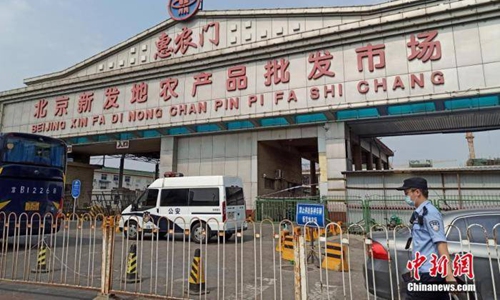Grocery prices jump in Beijing as new outbreak shuts wholesale markets
Source:Global Times Published: 2020/6/15 17:02:53

Beijing Xinfadi Market. Photo: Chinanews.com
Groceries in Beijing see sharp price rises following the shutdown of six major wholesale markets in the Chinese capital city of more than 20 million.
The price hike is weighing on small vendor's business while large-scale supermarkets and e-commerce platforms are unaffected.
On Monday morning, grocery stores in Beijing saw their prices of fruits and vegetables jump by 200 percent due to the closedown of the six wholesale markets, due to the latest outbreak of three dozens of COVID-19 cases. All the cases are related to the Xifadi Wholesale Market.
A Beijing resident surnamed Fan who went to the Jinbao wholesale market outside the East Fifth Ring Road told the Global Times that half of the dealers selling vegetables, fruits and meat products did not show up in the market which usually has more than 100 wholesalers.
"I was told by other dealers that those who did not show up have been put under medical watch after taking nucleic acid tests, as they usually got their products at Xinfadi market," Fan said.
She said that the prices of products at the market have tripled now.
Restaurants and smaller grocery vendors are heavily affected by the sudden surge of prices.
An owner of a Sichuan restaurant in Chaoyang district told the Global Times that grocery prices are jumping in Dayanglu Market, one of Beijing's biggest wholesale markets and the main supply source of the city central.
The prices of vegetables have more than doubled in the market since Saturday, with potatoes see the sharpest price hile from around one yuan ($0.15) to three yuan per kilogram now.
Six markets, including the Xinfadi market, have been ordered to shut down since Saturday. According to the Beijing Municipal Bureau of Commerce, Xinfadi wholesale market alone supplies about 70 percent of the city's vegetables and around 10 percent of its pork.
Ms Shi, an owner of a fruit store in Beijing told the Global Times that fruits prices have also seen slight increase since Saturday, but the price increase remain moderate.
The grocery prices may be pushed up for the short term, as a large number of buyers are shifting from the six closed markets to other markets still in operation.
Restaurant owners in Chaoyang district confirmed to the Global Times that there is no shortage of vegetable supplies, despite the price hike and there were an unusually large number of buyers in the Dayanglu Market on Sunday and Monday.
Large supermarket chains and e-commerce platforms are largely unaffected by the market shutdown, thanks to their exclusive supply chains aligned with the farmers.
A manager of the Jingkelong supermarket in Beijing, a Hong Kong listed supermarket chain told the Global Times on Monday that the store's vegetables supplies are allocated from the headquarters, which remains unaffected by the wholesale market.
However, the manager said there has appeared a slight panic buying in the neighborhood, and vegetables are usually sold out by the afternoon.
Large supermarkets are scaling up vegetable stocks to meet the sudden surge in local demands. Wumart, one of the largest supermarket chains in the Beijing-Tianjin-Hebei area have stocked up 1,500 tons and vegetables and 600 tons of fruits, three times of its usual supply amount.
Hema Supermarket, a large grocery e-commerce platform run by Alibaba, told the Global Times that the company's supplies have been stable, and it is sourcing directly from farmers and cooperatives instead from wholesale markets.